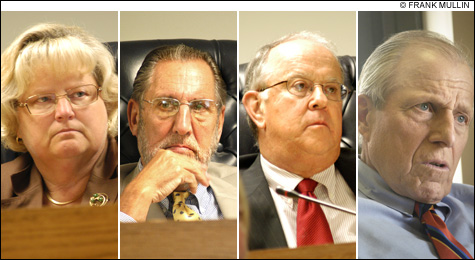
COLD COMFORT Rising heating costs may focus more attention this winter on PUC commissioners
(left to right) Bray, Germani, and Holbrook, but for now, Harsch is among a small band of outspoken
critics. |
As winter approaches and energy prices rise worldwide, Rhode Islanders will wince when they open their monthly bills for electricity and natural gas.
For all the unwelcome sting of these worsening costs, most consumers feel powerless to change the situation.
Yet after watching the Rhode Island Public Utilities Commission (PUC) approve a 21.7 percent increase in National Grid’s electricity prices in July, and a nine percent hike in the company’s natural gas prices, two outspoken critics are renewing calls to revamp the state agency.
The PUC, they say, represents the interests of the utilities, not the public— in part because Republican Governor Donald L. Carcieri’s reappointed former utility executives to key regulatory posts.
In mid-winter, the PUC will gain further scrutiny when National Grid seeks further rate increases. By January, it must again adjust electric rates due to changes in fuel prices.
In addition, the PUC in March will review National Grid’s long-term electricity purchasing contracts, which will affect rates starting in 2010. In the short term, gas prices should remain the roughly the same. The PUC is currently considering a National Grid request for a five percent rate hike to pay for its pipes and overhead, and a separate 4.6 percent rate decrease due to lower than expected natural gas prices.
The recent rate hikes mean the typical residential electricity user’s bill will climb about $16 a month, to $93, according to a state Division of Public Utilities and Carriers’ analysis. The typical residential natural gas bill will increase about $10 a month, to $130. Since July 2002, natural gas rates have risen 51 percent, according to the analysis, and electricity rates 72 percent.
J. William Harsch, a lawyer in War-wick, who chaired the PUC in 1975 and 1976, says state regulators are doing a miserable job. “They have so totally screwed up regulation of utilities in Rhode Island,” he says, “we would probably be better off without them.”
PUC commissioners insist they were compelled to approve National Grid’s recent rate-hike requests because federal and state regulators already approved the company’s contracts to purchase gas and electricity, and since state law requires the PUC to pass those costs on to consumers. Growing worldwide demand for fossil fuels and a non-existent federal energy policy are to blame, they say, not their purported allegiance to the utilities.
Such comments infuriate Harsch. “If they are that helpless, find another job,” he fumes. Referring to his tenure as PUC chairman, he says, “We found ways to deal with automatic [increases].”
Hearings, perhaps in cooperation with other states in which National Grid operates, should have been held to determine if the London-based company’s energy purchases were prudent, Harsch says. If the utility was found not to be prudent in its buying of energy futures, he adds, “The commission has the ability to make [National Grid] swallow some of their indiscretion.”
The problem, he concludes, is, “Two commissioners are committed totally to the well-being of the utility.”